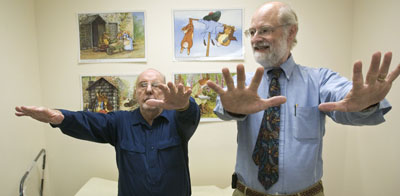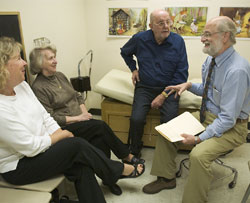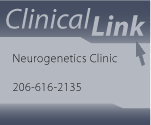Inherited Neurological Disorders
Dr. Thomas Bird tracks genetics of nervous system diseases
Dr. Thomas Bird was one of the first people to enter his specialized field of work. In 1974, only a handful of scientists were studying why certain neurological disorders run in families. Bird is the director of the UW Neurogenetics Clinic, founded 30 years ago as one of the first of its kind in the United States.

Dr. Thomas Bird (left) compares hand steadiness with his patient.
Bird became interested in neurogenetics when Dr. Arno Motulsky, professor of medicine and genome sciences and founder of the UW Division of Medical Genetics, needed someone with a neurology background to work in the Medical Genetics Clinic.
"The medical geneticists needed a neurologist to give advice and consultation about families with neurologic diseases," Bird said.
Bird was completing his neurology residency at the UW at that time. After that, he completed a fellowship with Motulsky, during which he got additional training in genetics, and then specialized in genetic diseases of the nervous system such as Alzheimer's disease, Huntington's disease, and hereditary neuropathies such as cerebellar ataxias.
"I found it was a good match for me," Bird said. "I was attracted to those kinds of diseases and those kinds of issues."
 |
| Dr. Bird meets with a family at the Neurogenetics Clinic. |
In the clinic, Bird sees patients with hereditary diseases of the nervous system and their families. A team consisting of Bird, genetic counselors, a social worker and a nurse evaluates each patient's clinical and diagnostic issues and discusses possible genetic testing.
Genetic counselors in the clinic also talk with patients about the impact the hereditary disease could have on his or her life. Sessions sometimes include asking a patient who should share knowledge about test results and discussing how results might affect the ability to get medical or life insurance.
In his research, Bird is trying to find genes that cause hereditary diseases of the nervous system. So far, there have been some significant discoveries. One was made while working with Dr. Gerard Schellenberg, a molecular biologist, and Dr. Ellen Wijsman, a statistical geneticist.
"Our research team found the Presenilin 2 gene, which causes an early-onset form of familial Alzheimer's," Bird said.
Another gene discovery was made while he was working with Dr. Phillip Chance, chief of the Division of Genetics and Development in the Department of Pediatrics, and Dr. Valerie Street of the Bloedel Hearing Research Center. The team discovered a gene that causes a type of Charcot-Marie-Tooth hereditary neuropathy.
Some other genes discovered include one causing frontotemporal dementia, also known as Pick's disease, and another responsible for a type of spinocerebellar ataxia.
"None of those genes were known 10 years ago," Bird said.
Although his research is not an attempt to cure diseases, his work does contribute to that long-term goal.
"The ultimate goal is to find treatment and prevention for these diseases," Bird said. "We hope that finding the genes will lead to ideas of how to treat the diseases."
In addition to his position at the Neurogenetics Clinic, Bird serves as an investigator in the Geriatrics Research Center at the Veterans Affairs Puget Sound Health Care System, director of the Huntington's Disease Center of Excellence at the UW, head of the clinical core of the UW Muscular Dystrophy Center, and chief of the Division of Neurogenetics in the School of Medicine's Department of Neurology.
He has received the Wartenberg Prize from the American Academy of Neurolgy and the Jacoby Award from the American Neurological Association.
